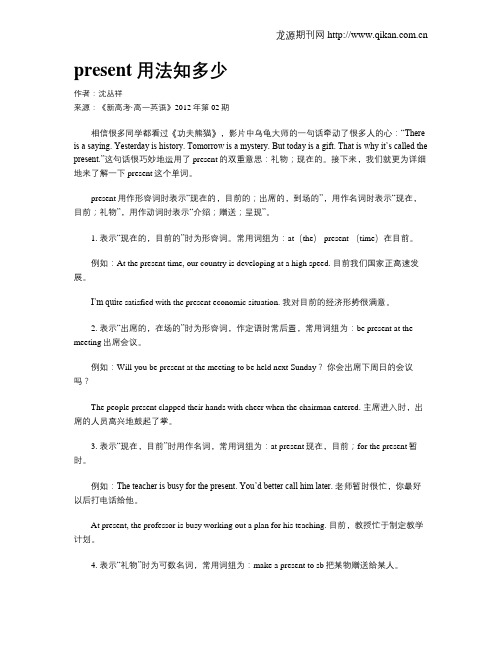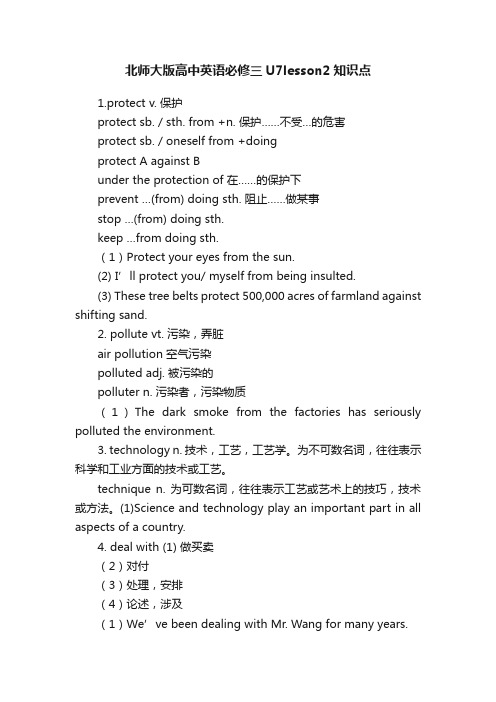present可数吗
必修五第五单元知识点(2)

必修五Unit5(2)1.Honorn. 不可数荣誉,尊敬;名誉It‟s a point of honor with me to reply all my debts promptly.可数引以为荣的人/事,只用单数。
The successful launch of the “Shenzhou VI” is an honor to our country.do sb an honor /the honor (of doing sth)使某人有特殊的荣幸,赏光Will you do me the honor of dining with me? 可否赏光和我一起吃饭?in sb‟s /sth‟s honor出于对…的敬意We are planning a big Christmas party in your honor.我们正筹备为你举行一次盛大的圣诞晚会。
in honor of… ,为纪念…,为庆祝…A monument was built in honor of the heroes who gave up their lives during the war.为了纪念在战争中献身的英雄们,建立了一座纪念碑。
Honorv.给予表扬(或奖励、头衔、称号)honor sb/sth (with sth)The President honored us with a personal visit.be honored for…因…而受到尊敬Dr Bethune was honored for his selfless work.白求恩大夫由于他无私的工作而受到赞誉。
be/feel honored that…很荣幸能做…I am honored that you should notice me.我很荣幸您能注意到我。
be/feel honored to do 很荣幸能做…。
I am honored to be here with you.能和你在这里我感到很荣幸。
最常见的不可数名词有1

最常见的不可数名词有:advice, baggage, change(零钱), furniture(家具), hair, homework, information, knowledge, luggage(行李), money, news, progress, traffic 其它不可数名词还有:absence, age, anger, courage, energy, equipment, experience, failure, fear, food, fun, health, ice, industry, kindness, labour, luck, marriage, music, nature, paper, peace, pleasure, power, pride, rain, research, respect, safety, salt, sand, silence, sleep, strength, snow, technology, time, trade, transport, travel, trust, truth, waste, water, wealth, weather, wind, world英语常用词组荟萃Aabove all 首先,首要according to 根据act upon each other 相互作用adapt oneself to 使自己适应……adapt to 适应add…to…把…加入add up to 合计达address oneself to 向…讲话;与…通信a few (表示肯定)有些,几个a great quantity of (接可数或不可数)大量a good deal of (接不可数名词)许多,大量a large amount of (接不可数名词)大量a little (表示肯定)一些,一点点a lot of (接可数、不可数名词) 大量的,许多a number of (接可数名词)若干,许多above all 首先,首要,尤其是after all 毕竟,终究ahead of 在…前面,先于all but 几乎,差一点;除了…都all of a sudden 忽然all over 到处,遍及;全部结束。
中考英语英语 语法填空训练经典题目(附答案)100

中考英语英语语法填空训练经典题目(附答案)100一、英语语法填空1.阅读下面短文,在空白处填入一个适当的词,或填入括号中所给单词的正确形式。
An old man went to India. When he got there, he saw some fruit for sale, but most of it was very cheap. The ________ (cheap) thing has a basket of red fruit."How much per kilo?" the old man ________ (ask)."Two rupees (卢比)," the shopkeeper answered. Two rupees in India is almost nothing, ________ the old man bought a whole kilogram and started eating it.However, as soon as he started eating, his mouth began ________ (burn), his eyes began to water, and his whole face became as red ________ the fruit. As he coughed and struggled to breathe, he jumped up and ________, screaming: "Ah! Ah! Ah!"And yet he continued to eat the fruit. Some people who were looking at him shook their ________ (head) and said, "You are crazy! Those are chili peppers (辣椒)!You can't just eat them by the handful!"The old man said to ________ (he),"I paid for them, so I must eat them."This old man seemed pretty stupid. But are we so much smarter? All of us have ________ (spend) money and time on something-maybe a relationship, or a business, or a job-and sometimes, even if we know there's no hope that things will change, we still continue with it. What we can learn ________ the old man is this: if you've lost a lot over something that doesn't work, let it go and move on. It's better than continuing to lose.【答案】cheapest;asked;so;to burn /burning;as;down;heads;himself;spent;from【解析】【分析】文章大意:这篇短文主要讲述了一个人因为贪便宜,买了一些根本不能作为水果的辣椒。
present用法知多少

present用法知多少作者:沈丛祥来源:《新高考·高一英语》2012年第02期相信很多同学都看过《功夫熊猫》,影片中乌龟大师的一句话牵动了很多人的心:“There is a saying. Yesterday is history. Tomorrow is a mystery. But today is a gift. That is why it’s called the present.”这句话很巧妙地运用了present的双重意思:礼物;现在的。
接下来,我们就更为详细地来了解一下present这个单词。
present用作形容词时表示“现在的,目前的;出席的,到场的”,用作名词时表示“现在,目前;礼物”,用作动词时表示“介绍;赠送;呈现”。
1. 表示“现在的,目前的”时为形容词。
常用词组为:at(the) present (time)在目前。
例如:At the present time, our country is developing at a high speed. 目前我们国家正高速发展。
I’m qui te satisfied with the present economic situation. 我对目前的经济形势很满意。
2. 表示“出席的,在场的”时为形容词,作定语时常后置,常用词组为:be present at the meeting出席会议。
例如:Will you be present at the meeting to be held next Sunday?你会出席下周日的会议吗?The people present clapped their hands with cheer when the chairman entered. 主席进入时,出席的人员高兴地鼓起了掌。
3. 表示“现在,目前”时用作名词,常用词组为:at present现在,目前;for the present暂时。
高中英语词汇辨析系列16-30

16 account, account for和onaccount of1 account作名词用时,通常表示四种含义。
(1)表示“思考,考虑”,为不可数名词,相当于thought,consideration。
We should take into account the bad weather.我们必须考虑到坏天气。
=We should take the bad weather into account.(2)表示“利益,利润”,为不可数名词,相当于profit,advantage。
He found his account in doing the work.他从做那项工作中受益。
She put her knowledge to good account.她充分利用自己的知识。
(3)表示“账,账目,账户”,为可数名词。
Her job is keeping accounts.她的工作是记账。
He opened an account with the bank.他在那家银行开了一个账户。
名词()表示“叙述,报道《事件、人物)”,为可数She gave us an account of her life there.她给我们讲述了她在那里的生活。
Please give us a full account of what happened last night.请详细向我们说明昨晚发生的事情。
2 account for为短语动词,意为“说明(原因),解释(理由)”,相当于explain,give the reasonfor。
He can't account for his absence.他不能说明缺席的原因。
How do you account for your behaviour?你怎样解释你的行为?③ on account of意为“因为,由于”,通常作状语,不作表语,相当于owing to,because of。
五年级英语感叹句用法单选题30题

五年级英语感叹句用法单选题30题1. What a beautiful dress!A. HowB. WhatC. How aD. What an答案:B。
本题考查what 引导的感叹句。
what 引导的感叹句结构为“What + a/an + 形容词+ 可数名词单数!”,A 选项“How”引导的感叹句结构为“How + 形容词/副词+ 主语+ 谓语!”,不符合本题;C 选项“How a”不存在这种表达;D 选项“What an”,当后面单词是元音音素开头时用“an”,“beautiful”不是元音音素开头,所以用“a”,本题选B。
2. What lovely flowers!A. HowB. WhatC. How manyD. How much答案:B。
what 引导的感叹句结构为“What + 形容词+ 可数名词复数/不可数名词!”,A 选项“How”引导的感叹句结构不同;C 选项“How many”用于询问数量;D 选项“How much”用于询问不可数名词的数量或价格,本题是感叹句,用“What”,选B。
3. What a big house!A. HowB. WhatC. How bigD. How small答案:B。
“What + a/an + 形容词+ 可数名词单数!”是what 引导感叹句的常见结构,A 选项“How”引导的结构不符;C 选项“How big”一般不用于感叹句;D 选项“How small”也不用于这种感叹句,本题用“What”,选B。
4. What an interesting story!A. HowB. WhatC. How anD. What a答案:B。
what 引导的感叹句,“What + an + 形容词+ 可数名词单数!”,A 选项“How”引导的结构不对;C 选项“How an”不存在;D 选项“What a”,根据“interesting”是元音音素开头,用“an”,本题选B。
北师大版高中英语必修三U7lesson2知识点

北师大版高中英语必修三U7lesson2知识点1.protect v. 保护protect sb. / sth. from +n. 保护……不受…的危害protect sb. / oneself from +doingprotect A against Bunder the protection of 在……的保护下prevent …(from) doing sth. 阻止……做某事stop …(from) doing sth.keep …from doing sth.(1)Protect your eyes from the sun.(2) I’ll protect you/ myself from being insulted.(3) These tree belts protect 500,000 acres of farmland against shifting sand.2. pollute vt. 污染,弄脏air pollution 空气污染polluted adj. 被污染的polluter n. 污染者,污染物质(1)The dark smoke from the factories has seriously polluted the environment.3. technology n. 技术,工艺,工艺学。
为不可数名词,往往表示科学和工业方面的技术或工艺。
technique n. 为可数名词,往往表示工艺或艺术上的技巧,技术或方法。
(1)Science and technology play an important part in all aspects of a country.4. deal with (1) 做买卖(2)对付(3)处理,安排(4)论述,涉及(1)We’ve been dealing with Mr. Wang for many years.(2) The person is hard to deal with.(3)He’s able to deal with all kinds of troublesome cases.(4) That book deals with Asian problems.how 通常与deal with连用,what 通常与do with 连用。
各种英语语法中的时态,词性,结构的英文翻译

名词 noun 可数名词 countable noun 不可数名词 uncountable noun 介词 preposition 连词 conjunction 动词 verb及物动词 transitive verb 不及物动词 intransitive verb系动词 link verb 助动词 auxiliary verb 情态动词 modal verb短语动词 phrasal verb 感官动词 verb of senses 副词 adverb代词 pronoun 冠词 article 定冠词 definite article不定冠词 indefinite article 基数词 cardinal numeral 序数词ordinal numeral 单数形式 singular form 复数形式 plural form 一般疑问句 general question 特殊疑问句 special question过去将来时 past future tense过去将来进行时 past future continuous tense过去将来完成时 past future perfect tense一般现在时 present simple tense 一般过去时 past simple tense 一般将来时 future simple tense现在完成时 past perfect tense过去完成时 present perfect tense 将来完成时 future perfect tense 现在进行时 present continuous tense过去进行时 past continuous tense将来进行时 future continuous tense过去将来进行时 past future continuous tense现在完成进行时 present perfect continuous tense过去完成进行时 past perfect continuous tense。
- 1、下载文档前请自行甄别文档内容的完整性,平台不提供额外的编辑、内容补充、找答案等附加服务。
- 2、"仅部分预览"的文档,不可在线预览部分如存在完整性等问题,可反馈申请退款(可完整预览的文档不适用该条件!)。
- 3、如文档侵犯您的权益,请联系客服反馈,我们会尽快为您处理(人工客服工作时间:9:00-18:30)。
present可数。
意思为礼物,赠品,可数名词。
He often gave his neighbor's kids little
presents。
他常常送些小礼物给邻居的孩子。
用法
一、adj. (形容词)
1、 present作形容词表示“出席的,到场的”“存在的,含有的”时在句中主要用作表语,偶尔用作定语,一般须后置。
表示“现在的,目前的,现行的”“正在处理或讨论中的”时只用作前置定语。
2、 present无比较级和最高级。
二、n. (名词)
1、 present用作“现在,目前”解时,通常与定冠词the连用,只用作单数名词。
2、 present作“礼物”解时,一般指亲友间互送的“礼物”或“赠品”,多是出于好意、礼貌或尊敬等而予以赠送,并不一定期望报答或回赠。
是可数名词。
三、v. (动词)
1、 present的基本意思是“出现”,指人时多指“到场”“出席”,指物或事物时则指“显示”。
多接反身代词作宾语。
2、present也可作“介绍”“引见”解,多用于涉及的人地位高低不等的场合。
3、present可作“赠送,给予”解,此时多接双宾语,其间接宾语可以转化为介词to的宾语。
与present 有关的所有短语
at present现在 make a present of 拿……赠送
present oneself 出席、接受出诊
present arms 举枪敬礼 for the present 眼前暂时
the present day现代 present company excepted 不是在座诸位
on present form 就目前情况看 make a present of sth(to sb)(由于粗心)双手奉送 to present
yourself 到场
up to the present至今。
